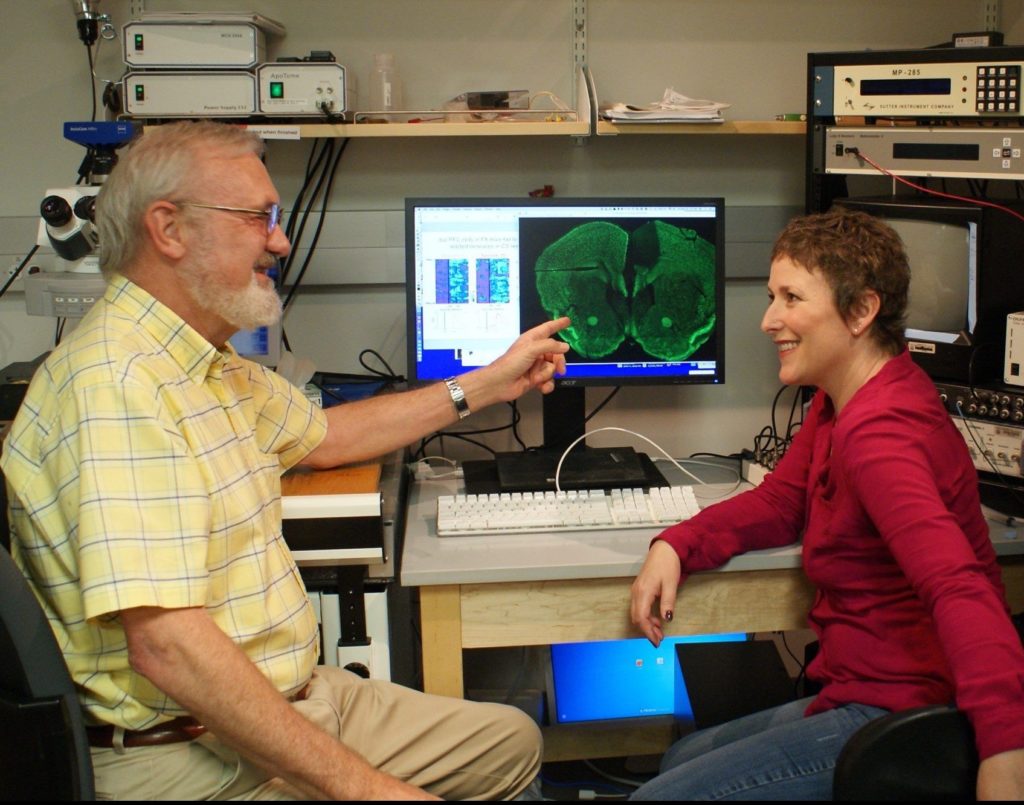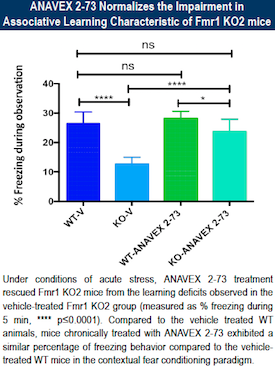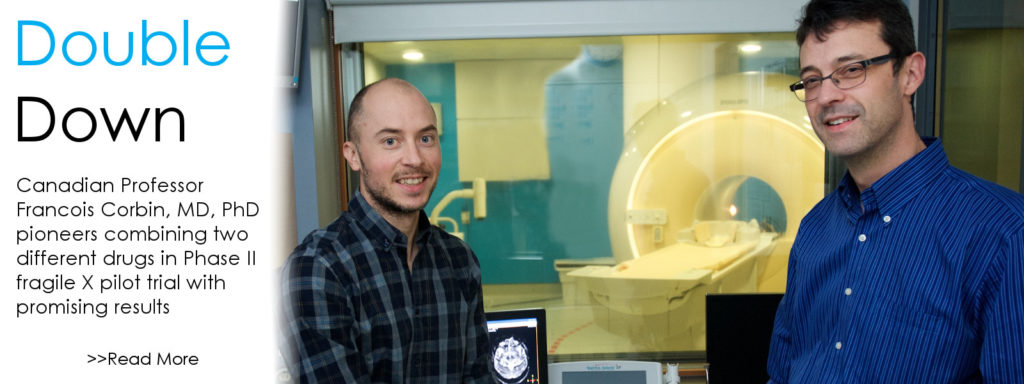Memory Lane: New Research to Improve Memory in Fragile X Mice
University of Texas at Austin Researchers Daniel Johnston, PhD, and Jennifer J. Siegel, PhD, explore ways to Iimprove memory in Fragile X mice.
New compound from Anavex Improves Learning and Behavior in Fragile X Mice
A potential new treatment for Fragile X syndrome is showing promise. While still early in development, the investigational drug was able to improve intellectual, learning and hyperactivity measures in a mouse model of Fragile X syndrome. Anavex 2-73 is a sigma-1 receptor agonist being developed for autism spectrum disorders, including Rett syndrome and Fragile X syndrome, and for Alzheimer’s disease. Anavex Life Sciences presented the data at the Gordon Research Conference for Fragile X and Autism-Related Disorders, held June 5-10, 2016 in Mount Snow, VT. The study was sponsored by FRAXA, via the FRAXA Drug Validation Initiative, and performed by Fraunhofer Chile Research, in Santiago, Chile.
Double Down: Fragile X Clinical Trial Combines Two Available Drugs
If all the science world’s a stage, Fragile X researchers are more than merely players. They are center stage. So believes Francois Corbin, MD, PhD, professor, Université de Sherbrooke, Canada, who directs the university’s Fragile X Clinic. Corbin, who has received more than $100,000 in FRAXA support since 2012, is leading a pilot randomized Phase II trial, exploring the tolerability and the synergistic effect of a combined therapy.
Fragile X Fruit Fly Research Bears Fruit
A new FRAXA-funded study shows how the hormone insulin – usually associated with diabetes — is involved in the daily activity patterns and learning deficits in the fruit fly model of Fragile X Syndrome (FXS). The study also reveal a metabolic pathway that can be targeted by new and already approved drugs to treat Fragile X patients, notably metformin.
Abnormalities of Synaptic Plasticity in the Fragile X Amygdala
With FRAXA funding, Dr. Sumantra Chattarji at NCBS explored how Fragile X alters amygdala function. Results were published.
Crossroads of Fragile X and Alzheimers Research
Last week researchers at VIB Leuven in Belgium published evidence that a brain pathway involving the protein APP (Amyloid Precursor Protein) plays a vital role in development of Fragile X syndrome, one of the most common causes of autism. Scientists led by Dr. Emanuela Pasciuto in the laboratory of Prof Claudia Bagni published findings of their study in the journal Neuron.
Boston Bruins Grant Funds New Fragile X Research
The Bruins Foundation pledged $90K to FRAXA, funding new Fragile X research at Gateway Farm in Merrimac, MA.
Fragile X Programs at UMASS – University of MA, Worcester
Fragile X Syndrome Behavioral Health Clinic The Center for Autism and Neurodevelopmental Disorders (CANDO) is opening a specialty clinic for individuals with Fragile X Syndrome (under the direction of Dr. Jean Frazier) to evaluate and provide treatment for behavioral challenges.
The Endocannabinoid System in a Mouse Model of Fragile X Syndrome
Fragile X disrupts endocannabinoid signaling. This study in mice demonstrated that correcting it may calm brain hyperexcitability and improve symptoms.
Inhibitors of STEP as a Novel Treatment of Fragile X Syndrome
STEP inhibition reversed behavioral and synaptic Fragile X deficits in mice (Neuropharmacology, 2018), highlighting STEP as a promising treatment target.
Bcl-xL Inhibition as a Therapeutic Strategy for Fragile X Syndrome
Fragile X neurons show leaky mitochondria and excess Bcl-xL–driven synapses. Targeting this pathway may restore energy balance and healthier brain development.
Seizures in Fragile X Syndrome and Therapeutic Potential of NMDA Receptor Antagonists
Dr. Wong studies how NMDA and mGluR receptors interact to trigger seizures in Fragile X, revealing NR2B-specific blockers as a promising targeted treatment.
New Clue to Fragile X and Autism Found Inside Brain Cells
FRAXA-funded research revealed that mGluR5 isn’t only on the cell surface. Drugs may need to reach internal receptors to be effective in Fragile X.
Scientists Uncover Trigger for Fragile X Syndrome
A Weill Cornell team discovered that Fragile X stems from a gene being shut off—and a compound that blocks this process may prevent the condition.
Molecular mechanisms: Enzyme blockers help Fragile X mice
Dr. Jope won the 2013 FRAXA Pioneer Award for showing that lithium and other GSK-3–blocking drugs can reverse cognitive deficits in Fragile X mice.
Social Behavior as an Outcome Measure for Fragile X Clinical Trials
FRAXA funding helped identify reliable social behavior tests in Fragile X mice and showed an mGluR5 treatment could improve sociability, guiding future trials.
Glycogen Synthase Kinase-3 (GSK3), Lithium and Fragile X
Dr. Jope found that lithium (at usual therapeutic doses) and investigational GSK3 inhibitors can reverse a number of cognitive deficits in FMR1 knockout mice.
The mTOR Pathway in Fragile X Syndrome
FRAXA-funded research showed that blocking S6K1 in Fragile X mice improves social, behavioral, and physical symptoms.
Fragile X Treatment Strategy Emerges from FRAXA Research: IGF-1
Neuren’s Trofinetide, part of a promising IGF-1 drug class, showed standout results in Fragile X mice—outperforming Rett syndrome models.
Effects of minocycline on vocal production and auditory processing in a mouse model of Fragile X
With FRAXA funding, Dr. Khaleel Razak and Dr. Iryna Ethell explored robust biomarkers relevant to the FXS and the efficacy of minocycline treatment.
Phase 2b Clinical Trial of Arbaclofen in Autism Has Disappointing Results
The Phase 2b arbaclofen trial in autism didn’t improve social withdrawal, but did show progress on the Clinical Global Impression of Severity scale.
What Works, and What Doesn’t
Early on, no one knew which path would work. Now the results are clear, and they’re directing FRAXA toward the next major Fragile X treatment breakthrough.
Reward Function in Fragile X Syndrome
Loss of FMRP disrupts dopamine-driven reward function—Fragile X mice show impaired cocaine sensitization and place preference, revealing new plasticity defects.
Inherited Channelopathies in Cortical Circuits of Fmr1 KO Mice
Researchers found that Fragile X brain circuits show faulty ion channel activity (channelopathies). Fixing these channels may restore normal brain signalling.




















